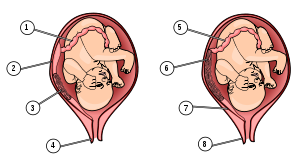 Image via WikipediaDieting During Early Pregnancy Alters Fetal Brain Development
Image via WikipediaDieting During Early Pregnancy Alters Fetal Brain DevelopmentBy Drucilla Dyess
Published: Wednesday, 19 January 2011
Researchers from the University of Texas have found that dieting during early pregnancy can cause substantial damage to the developing brain of the fetus, leading to lower IQ and behavioral problems. The potential for harm to the fetus is present whether the consumption of a low calorie diet is intentional or unintentional, and the risk has been found to be even more significant for teenage mothers and women who get pregnant later in life. The details of the study appear in the latest issue of the journal Proceedings of the National Academy of Sciences.
For their study, the researchers compared two groups of baboon mothers at the primate research center of the Southwest Foundation for Biomedical Research (SFBR). While one group of expectant mothers was allowed to eat as much as they pleased during the first half of their pregnancy, the other group was restricted to consuming 30 percent less food. The restricted diet is similar to what many women eat during early pregnancy, particularly those who experience morning sickness.
Among mothers who were fed a reduced diet during the first half of pregnancy, the research team discovered that fetuses suffered decreased formation of cell-to-cell connections, cell division, and amounts of growth factors. Further findings indicated that the nutritional deficiency resulted in the stunted growth of hundreds of neurons and genes that function as regulators in cell growth and development.
In a statement regarding the findings of the study, researcher Dr Peter Nathanielsz, director of the Center for Pregnancy and Newborn Research at the University of Texas' Health Science Center School of Medicine, pointed out that early pregnancy is a “critical time window when many of the neurons as well as the supporting cells in the brain are born.”
Although animals were used for the study, the researchers believe that the findings will also hold true for humans. Previous studies have shown that marked restriction of nutrients in human expectant mothers, such as those experienced during famine conditions, results in significant affects on the brain development of the fetus.
Dr Thomas McDonald, senior study author noted, “This study is a further demonstration of the importance of good maternal health and diet.” He added that the study “supports the view that poor diets in pregnancy can alter development of fetal organs, in this case the brain, in ways that will have lifetime effects on offspring, potentially lowering IQ and predisposing to behavioral problems.” McDonald also pointed out that the study challenges the broadly held view that mothers to be can protect their unborn babies from poor diets during pregnancy.
For a mother to be, focusing on your own health can play a major role in protecting the health of your unborn child. Although you need a sufficient amount of nutrients when eating for two, avoid eating a high-fat diet, as studies have shown that too much fat in your diet can have a negative impact on the risk for birth defects. Following a healthy diet can help you keep your level of nutrition and weight gain in check.
Taken from below article:
Dieting During Early Pregnancy Alters Fetal Brain Development

No comments:
Post a Comment